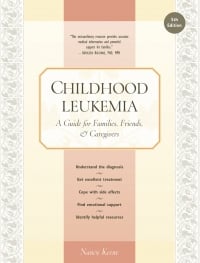Childhood Leukemia
Websites
This section lists websites that are not included in Appendix B, Resource Organizations, but that many parents find helpful. As with any resource, check with your child’s treatment team about the accuracy of any information found on websites.
Calendars and practical help
CareCalendar
CareCalendar is a free service to organize meals and other help for families in need. The coordinator can upload photos and status updates to these password-protected sites.
CaringBridge
CaringBridge allows people who are ill or injured to create a website to share medical updates and personal photos with those who care about them. This website also provides users with the ability to post a simple task calendar to let supporters help with meals and chores.
An online task scheduling and information-sharing website for families that need support from friends and family. The site allows the site manager to sign up new members, schedule tasks, communicate needs, and post messages and photos to members of the community.
My Med Schedule App
A software application to help you keep track of medication schedules, dosages, and any other important information, with reminder timers. You can record lab results and track them over time. The app is password protected and can be used from a computer, smartphone, or other device.
Dictionary
National Cancer Institute Dictionary of Cancer Terms
This dictionary provides definitions of cancer terminology.
Education
Wrightslaw
This site provides accurate, up-to-date information about special education laws for parents, advocates, and attorneys.
Employment and family leave
National Conference of State Legislatures
www.ncsl.org/research/labor-and-employment/state-family-and-medical-leave-laws.aspx
This site lists state family medical leave and parental leave laws for all 50 states.
U.S. Department of Labor
The Wage and Hour Division of the Department of Labor provides detailed information about employees’ rights under the Family and Medical Leave Act.
Fundraising
YouCaring
YouCaring allows individuals to create a webpage to raise money for medical expenses or other pressing bills. The link to your page can be shared by email and on social media so friends, family, and community members can help to spread the word widely and donate to you directly. Several other personal fundraising sites are available, including www.gofundme.com and www.crowdrise.com. Fundraising sites charge varying fees for processing the money donated, so read the fine print very carefully.
General online medical resources
Medline Plus
www.nlm.nih.gov/medlineplus/druginformation.html
A service of the National Institutes of Health, this site provides accurate information about drugs, including precautions and side effects.
National Cancer Institute
A huge, reliable site that provides accurate information about cancer, treatments, and clinical trials.
Pediatric Oncology Resource Center
Excellent source of information about pediatric cancers created and managed by a mother of a long-term survivor. Contains detailed and accurate material about diseases, treatment, family issues, activism, bereavement, and survivorship. It also provides links to other helpful cancer sites.
PubMed
The National Library of Medicine’s free search service provides access to more than 25 million citations in MEDLINE and PREMEDLINE (with links to participating online journals) and other related databases.
Quackwatch
This is an international network of people who post information about health-related frauds, myths, fads, fallacies, and misconduct.
Rx List—The Internet Drug Index
www.rxlist.com/drugs/alpha_a.htm
This site provides accurate information about prescription medications and a medical dictionary.
Survivorship
Ped-Onc Resource Center Survivor Issues
This collection of information for families of survivors includes resources, technical and nontechnical articles, accurate information about late effects, sources of scholarships for survivors, list of survivorship clinics, and much more.
Children’s Oncology Group Long-term Follow-up Guidelines
www.survivorshipguidelines.org
This downloadable document details current knowledge about the late effects of childhood cancer. The late effects are listed by treatment (chemotherapy drug or radiation dose/site) and guidelines for needed diagnostic tests are provided. It includes individual “Health Links” with information about dozens of specific late effects.
Table of Contents
All Guides- Introduction
- 1. Diagnosis
- 2. Overview of Childhood Leukemia
- 3. Acute Lymphoblastic Leukemia
- 4. Acute Myeloid Leukemia
- 5. Juvenile Myelomonocytic Leukemia
- 6. Chronic Myelogenous Leukemia
- 7. Telling Your Child and Others
- 8. Choosing a Treatment
- 9. Coping with Procedures
- 10. Forming a Partnership with the Medical Team
- 11. Hospitalization
- 12. Central Venous Catheters
- 13. Chemotherapy and Other Medications
- 14. Common Side Effects of Treatment
- 15. Radiation Therapy
- 16. Stem Cell Transplantation
- 17. Siblings
- 18. Family and Friends
- 19. Communication and Behavior
- 20. School
- 21. Sources of Support
- 22. Nutrition
- 23. Insurance, Record-keeping, and Financial Assistance
- 24. End of Treatment and Beyond
- 25. Relapse
- 26. Death and Bereavement
- Appendix A. Blood Tests and What They Mean
- Appendix B. Resource Organizations
- Appendix C. Books, Websites, and Support Groups

